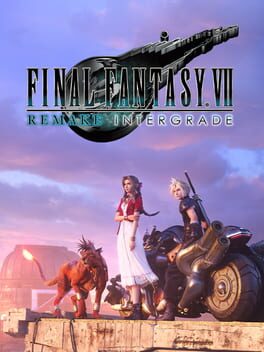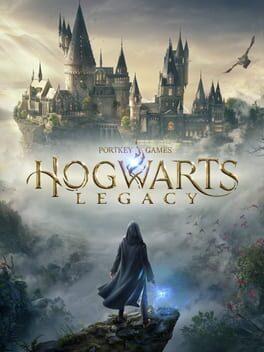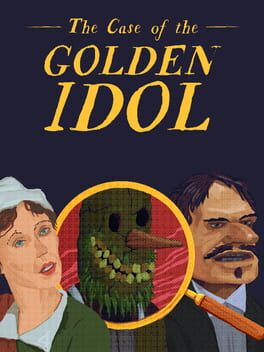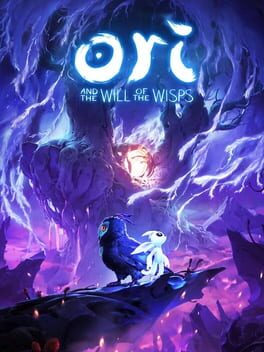fiokka
Playing this right after playing the original Final Fantasy VII added a new wonder to every interaction, location, and especially battle... on the flipside, it made it very, very obvious where the padding went in. Towards the halfway point I found myself very frustrated with how stretched out even the smallest moments of the original game were.
Still, the character work here is amazing, Midgar is an incredible location, whenever the story is moving it's very often full of charm and excitement. The combat emphasizing constantly switching up between party members keeps things fresh and kinetic, although I wish it was a bit more generous with materia slots.
The Yuffie DLC did wonders for Yuffie herself, even if her muscly big bro-type companion felt like a chore to drag around. I was a bit tired of seeing the same Midgar/Shinra locations at this point, but I can sympathize with the devs wanting to keep production time/cost down.
I hope that Rebirth values my time a bit more, and doesn't unnecessarily pad out every possible encounter just to add more time... or at least make them more exciting than moving robot arms around when they do. Get Rebirth to PC soon, Square Enix!
Still, the character work here is amazing, Midgar is an incredible location, whenever the story is moving it's very often full of charm and excitement. The combat emphasizing constantly switching up between party members keeps things fresh and kinetic, although I wish it was a bit more generous with materia slots.
The Yuffie DLC did wonders for Yuffie herself, even if her muscly big bro-type companion felt like a chore to drag around. I was a bit tired of seeing the same Midgar/Shinra locations at this point, but I can sympathize with the devs wanting to keep production time/cost down.
I hope that Rebirth values my time a bit more, and doesn't unnecessarily pad out every possible encounter just to add more time... or at least make them more exciting than moving robot arms around when they do. Get Rebirth to PC soon, Square Enix!
1997
I have played many of the Final Fantasy games before and after VII, but admittedly the early 3D graphics always warded me off of this one. After dipping into the extensive mod base of Seventh Heaven that gave an HD shine to most of the game, I was pretty pleased to find that this game definitely holds up. The foundation of the Active Time Battle system is maybe a bit of a wobbly step sideways into figuring out how to handle turn based and real time battles, but otherwise it does keep the flow of battle moving, although navigating enormous list of items is a bit more of a cost sink than it should be. Generally there's not a lot of active strategy involved in all but the toughest battles, and more piecing together what equipment/materia synergizes the best--although, admittedly, I used guides for figuring this out.
This game is pretty guilty of most of the genre annoyances of this era: endless random encounters, convoluted, strategy-guide-heavy sidequests that feel too masochistic for me to take a whack at--anything that involves hours of grinding is, in my opinion, almost smugly wasting your time--constant backtracking.
Even still, you can definitely feel the scope of this game from the very beginning. I found the core cast and story beats to be affecting all these years later. The major emotional moments still felt moving, even with the plastic, stiff polygonal models. While later Final Fantasy games (including games within the Compilation of FFVII) would get more and more elaborate and perhaps even bloated, FF7 is just on this edge of having interesting layers to peel back while never getting too far up its own intestines. In some ways it reminds me a bit of how Souls games really hook you in with leaving a lot of juicier details in the background for you to put together, giving you a sense of greater investment.
This game is pretty guilty of most of the genre annoyances of this era: endless random encounters, convoluted, strategy-guide-heavy sidequests that feel too masochistic for me to take a whack at--anything that involves hours of grinding is, in my opinion, almost smugly wasting your time--constant backtracking.
Even still, you can definitely feel the scope of this game from the very beginning. I found the core cast and story beats to be affecting all these years later. The major emotional moments still felt moving, even with the plastic, stiff polygonal models. While later Final Fantasy games (including games within the Compilation of FFVII) would get more and more elaborate and perhaps even bloated, FF7 is just on this edge of having interesting layers to peel back while never getting too far up its own intestines. In some ways it reminds me a bit of how Souls games really hook you in with leaving a lot of juicier details in the background for you to put together, giving you a sense of greater investment.
2023
Hogwarts Legacy is an up and down experience, with each success being marred by a necessary caveat. Hogwarts Castle is one of the best realized video game environments I've ever seen--and yet spend a few hours there and the emptiness of the castle becomes overbearingly apparent. The joy of sitting in for the Sorting Ceremony and choosing your wand is exciting for any long-time fan of the series--but I couldn't help but be let down by the impersonal nature of it all. I'm ready to be charmed by my Hogwarts friends, but they function more as tutorial bots for the majority of the game than real characters.
The most remarkable part of the game is that it does manage to be a solid experience, despite everything. I can credit the developers and publisher for not twisting the game into a GAAS cash grab, and I hope that Portkey Games is able to take the solid foundation and pare away the bits that simply drag it down.
The most remarkable part of the game is that it does manage to be a solid experience, despite everything. I can credit the developers and publisher for not twisting the game into a GAAS cash grab, and I hope that Portkey Games is able to take the solid foundation and pare away the bits that simply drag it down.
I'm delighted to see more deductive reasoning/"Obra Dinn-likes"--although in some ways it felt like a step back from Obra Dinn's ingenious logbook form of deduction. Instead, Golden Idol takes a "mad lib" approach: so as a necessity the game must rely on directly giving words to bank for solutions and explicitly providing information (for example, telling me directly a sword is clean or a latch is broken in tool tips) instead of allowing me to deduce.
Still, this allows for a wider variety of mysteries with more complicated stories playing out over many years. You'll come to recognize the same characters weaving in and out of the story and your general knowledge of the secrets of this world evolve alongside it (but not entirely paying off for me--I guessed the major twist early on). Golden Idol makes it easy to hop back to earlier scenarios to refresh your memory like you're Columbo coming back for "just one more thing"--although I couldn't always shake the feeling I was cheating when I did this.
I love games that compel me to pull out a notebook and start writing things down, which I was definitely doing here--although due to the heightened complexity of the type of mystery you're trying to solve, at times it felt more like rote information gathering, especially whenever the game would dump a pile of clues on my head. On that note, I do wish the game had let the player log a personal clue bank, like notes or diagrams that the player thought was valuable information.
The DLC saw a marked visual and musical upgrade, an improvement I'm excited to see Color Gray Games taking into their sequel, The Rise of the Golden Idol.
Still, this allows for a wider variety of mysteries with more complicated stories playing out over many years. You'll come to recognize the same characters weaving in and out of the story and your general knowledge of the secrets of this world evolve alongside it (but not entirely paying off for me--I guessed the major twist early on). Golden Idol makes it easy to hop back to earlier scenarios to refresh your memory like you're Columbo coming back for "just one more thing"--although I couldn't always shake the feeling I was cheating when I did this.
I love games that compel me to pull out a notebook and start writing things down, which I was definitely doing here--although due to the heightened complexity of the type of mystery you're trying to solve, at times it felt more like rote information gathering, especially whenever the game would dump a pile of clues on my head. On that note, I do wish the game had let the player log a personal clue bank, like notes or diagrams that the player thought was valuable information.
The DLC saw a marked visual and musical upgrade, an improvement I'm excited to see Color Gray Games taking into their sequel, The Rise of the Golden Idol.
I approached the game looking for an experience closer to Ori and the Blind Forest, and was a bit disoriented by the pivot in the direction of Hollow Knight. Once I re-calibrated my expectations, I had no trouble getting into Ori's beautiful backdrops, soundtrack, fluid movement, and well-paced difficulty curve.
Despite these changes, Will of the Wisps does end up sharing some flaws with its predecessor. The visual splendor can end up bedazzling the senses: background blends into foreground and the lightshow of combat can end up completely obscuring Ori and the enemy.
And, as with the first game, the story feels like a hollow necessity, almost an aesthetic choice. Beautiful painterly indie with fully orchestrated soundtrack? Let's get those tears flowing! But the game drops the characters we know best from the first game and introduces a horde of near identical one-note creatures that the player is unlikely to feel any personal attachment to, so these plot beats end up falling flat.
Still, the perfunctory nature of the story makes it easy to look past, and enjoy Ori's expanded movement capabilities and an increased focus on rhythm and the anticipation of momentum. While the wide array of movement choices did end up scrambling my senses sometimes--near identical movement is mapped to different triggers depending on the type of object--it's easy to find your flow and traverse the levels with an eye that is continuously being trained and refined by Ori's gentle difficulty curve.
Combat is upgraded from passable to playable, although it never achieves the heights of enjoyable, being mostly nuisances interrupting your flow when they're not the near-formality of the boss fights, aka nuisances with a cutscene.
It feels like not much of Ori and the Will of the Wisps will stay with me, good or bad. Still, Moon Studios knows how to put out a solid game, and there next purports to be the Zelda to this game's Mario. I'll look forward to it.
Despite these changes, Will of the Wisps does end up sharing some flaws with its predecessor. The visual splendor can end up bedazzling the senses: background blends into foreground and the lightshow of combat can end up completely obscuring Ori and the enemy.
And, as with the first game, the story feels like a hollow necessity, almost an aesthetic choice. Beautiful painterly indie with fully orchestrated soundtrack? Let's get those tears flowing! But the game drops the characters we know best from the first game and introduces a horde of near identical one-note creatures that the player is unlikely to feel any personal attachment to, so these plot beats end up falling flat.
Still, the perfunctory nature of the story makes it easy to look past, and enjoy Ori's expanded movement capabilities and an increased focus on rhythm and the anticipation of momentum. While the wide array of movement choices did end up scrambling my senses sometimes--near identical movement is mapped to different triggers depending on the type of object--it's easy to find your flow and traverse the levels with an eye that is continuously being trained and refined by Ori's gentle difficulty curve.
Combat is upgraded from passable to playable, although it never achieves the heights of enjoyable, being mostly nuisances interrupting your flow when they're not the near-formality of the boss fights, aka nuisances with a cutscene.
It feels like not much of Ori and the Will of the Wisps will stay with me, good or bad. Still, Moon Studios knows how to put out a solid game, and there next purports to be the Zelda to this game's Mario. I'll look forward to it.




